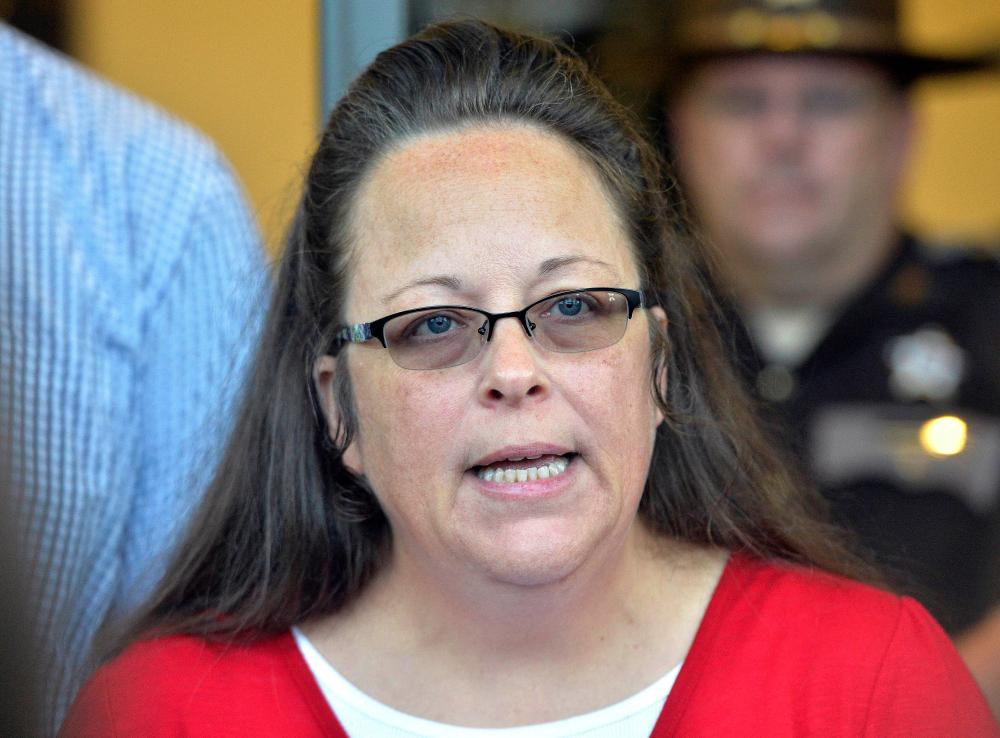The US supreme court on Friday is considering taking up a case that could challenge the legality of same-sex marriage across the country.
Hours after ruling that Donald Trump’s administration can block transgender and non-binary people from selecting passport sex markers that align with their gender identity, the justices are holding their first conference on the Davis v Ermold case. While their deliberations are typically kept private, the court may announce whether it will take the case as early as Monday.
The case involves Kim Davis, a former Kentucky county clerk who, in 2015, became a cause celebre for religious opposition to same-sex marriage after the US supreme court legalized the practice in the Obergefell v Hodges case. Davis repeatedly refused to issue marriage licenses to same-sex couples and, at the height of her fame, was even briefly jailed for contempt of court.
Related: US supreme court lets Trump block passport sex markers for trans and non-binary people
Two men, David Ermold and David Moore, sued Davis after she refused to give them a marriage license. After a trial, a jury awarded the couple $100,000 in damages. Davis appealed that decision, arguing that her conduct was protected by the first amendment’s guarantee of free exercise of religion.
The US court of appeals for the sixth circuit, however, rejected that argument in March of this year. Because Davis was operating within her capacity as a government official, she was not entitled to first amendment protections, the judges ruled.
“When an official’s discharge of her duties according to her conscience violates the constitutional rights of citizens, the constitution must win out,” the judges wrote. “The Bill of Rights would serve little purpose if it could be freely ignored whenever an official’s conscience so dictates.”
Now Davis wants the 6-3 conservative majority supreme court to overturn that ruling. Much of her petition to the high court focused on her contention that she deserves some form of protection from liability. “Anything less would leave the first amendment’s promises hollow to those who agree to public service and are sued for exercising their religious beliefs during that time,” her brief declared.
The brief also urged the supreme court to overturn Obergefell entirely. As part of their argument, attorneys for Davis praised the court’s 2022 decision overturning Roe v Wade and claimed that Obergefell is “not grounded in the nation’s history or traditions” – a paraphrase of the reasoning that the court used to demolish Roe and erase the federal right to abortion. Davis is being represented by Liberty Counsel, an organization that has previously represented anti-abortion activists.
While at least one advocacy group is planning to protest outside the supreme court on Friday, some legal experts have cautioned that the case remains a legal long shot. Because most of Davis’s arguments deal with the narrower question of her liability rather than the broader debate over same-sex marriage, the justices do not necessarily need to touch Obergefell to reckon with the questions at the heart of her case.
There is no guarantee that the supreme court will take up Davis’s case after its conference. Each term, the court receives somewhere between 5,000 and 7,000 requests to consider cases, but ultimately hears oral arguments in about 80 and issues orders in another 100, according to official estimates released by the supreme court. Justices also usually consider dozens of cases at each conference and tend to consider cases at multiple conferences before deciding to take them up. Four justices must agree in order for a case to be heard at oral arguments.
If the justices do use this case to tamper with Obergefell, Ermold and Moore’s brief in the case argued that it would entice other officials to break laws they do not support in the hopes of being bailed out by the high court.
“A decade since Obergefell, there are now nearly 800,000 married same-sex couples living across the United States,” their brief argued. “Overruling Obergefell could call into question the constitutional status of existing same-sex marriages and disrupt the lives of those who aspire to, plan their affairs around and benefit from same-sex marriage.”

